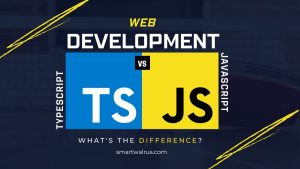What’s the Difference Between Java and JavaScript?

Java and JavaScript are two of the most popular programming languages today. We use these languages to develop software for websites, web browsers, desktop applications, mobile devices, and much more. But each language has its own advantages over the other.
In this article, we will explore the main differences between Java and JavaScript from a technical point of view by comparing their features and capabilities. So what is the difference between Java and JavaScript? Which should you use? Keep reading to find out!
Table Comparison: Java vs JavaScript
Here’s a comparison table highlighting the differences between Java and JavaScript:
| Aspect | Java | JavaScript |
|---|---|---|
| Type | Compiled language | Interpreted language |
| Usage | Used for server-side and desktop applications | Primarily used for web development |
| Runtime | Requires Java Virtual Machine (JVM) | Executes directly in web browsers |
| Syntax | C-like syntax with strict rules | Similar to C with some differences |
| Platform | Cross-platform | Primarily runs in web browsers |
| Compilation | Compiled to bytecode for the JVM | Interpreted line by line in browsers |
| Object-Oriented | Strongly adheres to OOP principles | Primarily follows OOP principles |
| Typing | Statically typed | Dynamically typed |
| Memory Management | Handles memory automatically with garbage collection | Limited memory management, can lead to memory leaks |
| Concurrency | Supports multi-threading and concurrency | Supports asynchronous programming |
| Use Cases | Desktop applications, server applications, Android development | Web development, browser interactions |
| Libraries | Rich set of libraries and APIs | Browser-based APIs and libraries |
| Development | Longer development cycles, compiled | Faster development cycles, interpreted |
| Tooling | Rich development environment | Integrated with browsers and text editors |
| Examples | Android apps, enterprise applications | Web interactivity, dynamic content |
| Frontend vs Backend | Primarily used for backend development | Primarily used for frontend development |
| Concurrency Model | Threads and synchronization mechanisms | Event-driven, callback-based |
| Inheritance | Supports single class inheritance | Supports prototype-based inheritance |
| Error Handling | Uses explicit exceptions | Uses try-catch blocks for exceptions |
| Learning Curve | Can have a steeper learning curve | Generally easier for beginners |
| Community & Ecosystem | Large community and ecosystem | Large and active web development community |
| Update Cycle | Releases new versions regularly | Evolves more informally, ECMAScript standards |
| Examples | Java applications, Android apps | Web interactivity, dynamic content |
What is Java?
Java is a programming language that was invented in 1991 by Sun Microsystems. It got widespread adoption when the Android operating system was developed. We use Java to create applications for a variety of different platforms, like computers, mobile devices, and embedded devices.
Here are some important key points about Java:
What is JavaScript?
JavaScript is a scripting language that was invented in 1995 by Netscape. It is now widely used across many industries to build web applications. JavaScript has become an industry standard, as it is supported by almost every major browser vendor.
Here are some important key points about JavaScript:
Key Differences Between Java and JavaScript
First, Java is a compiled language while JavaScript is an interpreted language. This means that Java code is converted into machine code before it is executed, while JavaScript code is executed directly by the browser.
Secondly, Java is a statically typed language while JavaScript is a dynamically typed language. This means that Java requires you to declare the type of data a variable will hold before you can use it, while in JavaScript you can simply use the data without declaring its type.
Third, Java is a platform-independent language while JavaScript is a platform-dependent language. This means that Java code can be run on a variety of different platforms, while JavaScript code can only be run on browsers and server-side through the JavaScript engine.
Finally, JavaScript has a larger community of developers than Java does. This means that there are more resources available to help you learn and work with JavaScript, whereas the JavaScript community is smaller and may not have as much support available.
Conclusion
Java and JavaScript are two of the most popular languages used in the software industry. They both have unique features that make them stand out from the crowd. However, they both support various programming paradigms and can be used in different areas of business and technology.
Which one you should use will depend on your specific project and your team’s preferences. As with any other programming language, you’ll find that one provides more utility than the other. In the end, it will come down to your own experience and expertise.
Java is a powerful general-purpose programming language that has stood the test of time. It runs on any platform and can be used to develop Android apps, among other things.
Whereas, JavaScript is a lightweight language that has become an industry standard for building web applications. It is easy to learn and supports almost every browser, making it an attractive choice for web development.



Related Programming
12 Best Python IDEs for Programming
Float vs Double: What’s the Difference?
What’s the Difference Between Computer Engineers and Computer Scientists?
25 Uses and Applications of Python Programming
From Zero to Hero: Learning Unity for Game Development
5 Best Modded Minecraft Hosting Providers
15 Careers That Use Python Programming
10 VR Programming Languages for Developing VR Applications